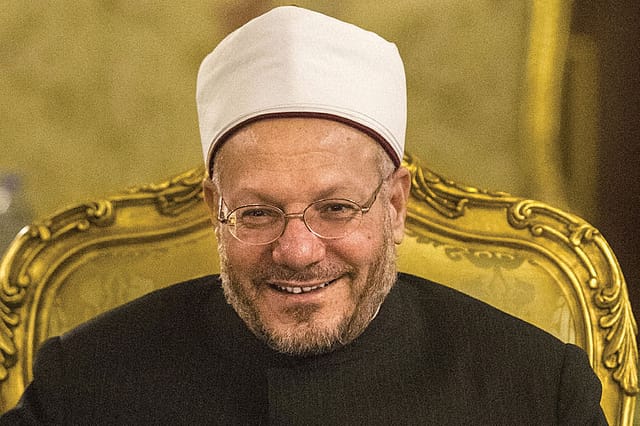Shawki Ibrahim Abdel-Karim Allam: Peace Messenger

AN UNUSUAL AND influential guest of the Indian Council for Cultural Relations (ICCR) is making news. On a six-day tour of Delhi, Aligarh, Agra, Jaipur, and Hyderabad, the Grand Mufti of Egypt Shawki Ibrahim Abdel-Karim Allam is interacting with students, clerics, and scholars from different faiths and members of civil society. Going by his initial comments, the Mufti seems keen to address the challenges Islam faces in interactions with other religions and the modern world, a subject of some relevance in India, with the world's third-largest Muslim population.
The Mufti's visit, as is often the case with ICCR's guests, came about with a recommendation from the Indian ambassador to Egypt and not long after Egyptian President Abdel Fattah el-Sisi was the chief guest at the Republic Day parade this year. The Mufti, though a religious figure, wields considerable influence in government and politics as he is the regime's primary source of religious authority, interpreting important jurisprudential matters. He also offers religious guidance on everyday issues and contemporary developments. In this respect, he is a symbol of authority throughout the Sunni world. The 19th Grand Mufti, Shawki, was selected by the council of senior scholars of Al-Azhar, the prestigious centre of Islamic learning.
In his earlier public statements and interactions, Shawki has spoken of the need for constructive engagement between religions to promote peace and co-existence. He has been critical of religious scholars who, he says, have rendered a distorted interpretation of religion that advocates violence. In his discussions with Christian leaders, he has said alliances between Muslims and Christians are not only possible but exist, and are to be seen among ordinary people in Egypt. For a society not unaffected by radical Islamist ideologies, the message is essential, and often enough, Shawki stresses the need for a practical and pragmatic approach to inter-faith relations.
Openomics 2026: Continuity and Conviction
06 Feb 2026 - Vol 04 | Issue 57
The performance state at its peak
As a leading religious figure in the Sunni world, Shawki can be asked if conservative interpretations of Islam by various influential seminaries have not achieved the opposite of the spirit of coexistence he seeks—a more inward focus within Islam and a rejection of other faiths. Yet, given the pulpit he occupies, the Mufti can be a force of moderation, crucial to dialling down tensions between faiths. His emphasis on relating religious texts to current contexts is important in light of seminaries issuing fatwas in a thoughtless manner. In a speech in 2017, he said, "Through exploring the evidence on which those extremists base their ideologies, we at Egypt's Dar al-Ifta, have concluded that they misinterpret legal texts and do not draw upon sound legal evidence." It's a message that can be amplified.
Shawki's repeated advice that Muslims need to be careful in accepting fatwas that are not in sync with present-day realities or are selective extracts from texts is relevant worldwide. Islamists everywhere, and India is no exception, have relied on alleged religious sanctions to wage war against "un-Islamic" societies and justify violence. The call for dialogue and recognition of diversity, coming from a learned cleric who heads Egypt's Dar al-Ifta, the country's top Islamic advisory council, can have a resonance among Muslims and other faiths at a time when antagonisms are on the rise. The message is particularly relevant in the context of divisive agendas of radical organisations convinced about the superiority of their faith, an attitude that unfailingly leads to polarisation and eventually, a backlash.
Shawki has drawn criticism for ratifying a number of death sentences which his office says are decisions referred to the Grand Mufti as part of standard procedure. Death sentences require the Mufti's approval but this is after judges have agreed on capital punishment. "The Grand Mufti reviews the cases referred to him by the criminal court and examines all papers from the beginning of the case. If he finds unequivocal evidence in the case papers that indicates the guilt of the accused according to Islamic law, he issues his opinion based on the evidence before him," Shawki's office said. However, this has not prevented European nations from hosting him and Western media from carrying his views prominently.
